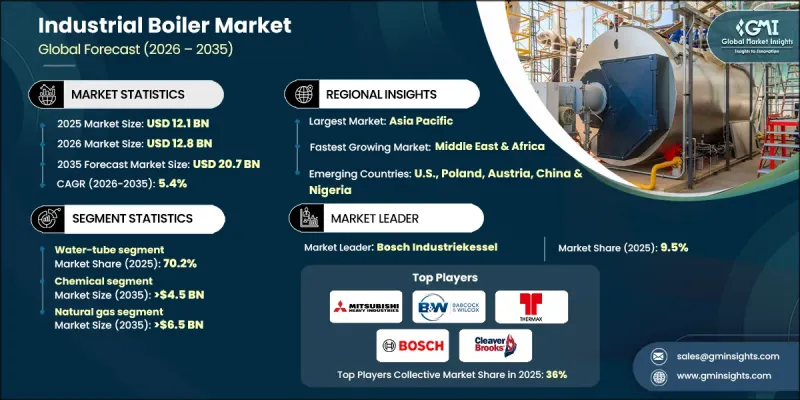
|
市場調査レポート
商品コード
1928959
産業用ボイラー市場の機会、成長要因、業界動向分析、および2026年から2035年までの予測Industrial Boiler Market Opportunity, Growth Drivers, Industry Trend Analysis, and Forecast 2026 - 2035 |
||||||
カスタマイズ可能
|
|||||||
| 産業用ボイラー市場の機会、成長要因、業界動向分析、および2026年から2035年までの予測 |
|
出版日: 2026年01月13日
発行: Global Market Insights Inc.
ページ情報: 英文 140 Pages
納期: 2~3営業日
|
概要
世界の産業用ボイラー市場は、2025年に121億米ドルと評価され、2035年までにCAGR5.4%で成長し、207億米ドルに達すると予測されています。

この成長は、化学、食品・飲料、パルプ・製紙、金属などの産業におけるプロセス熱需要の増加、および連続プロセス操業における処理量目標の向上によって推進されています。企業は、デジタル化された燃焼制御と酸素トリムシステムを備えた近代的な高効率燃焼ボイラーへの投資を進めており、これによりエネルギー管理と運転信頼性が向上しています。産業用ボイラーは、水に加熱して蒸気や温水を発生させるように設計された大型の密閉容器であり、製造、発電、化学処理などで広く使用されています。信頼性中心の保守(RCM)に支えられたコンパクトな水管式およびハイブリッド設計による老朽化した火管式ユニットの置き換えが、市場の普及を加速させています。硫黄酸化物(SOx)、窒素酸化物(NOx)、粒子状物質(PM)、二酸化炭素(CO2)に対する排出規制の強化と、許可審査の厳格化が相まって、先進的なバーナー、選択的触媒還元(SCR)システム、排ガス再循環(FGR)、高灰分耐性設計の需要を牽引しています。燃料価格の変動性とガス供給の不確実性は、ライフサイクルコストと運用リスクを最適化するため、多燃料対応ユニットと迅速な燃料切替システムの採用を促進しています。
| 市場範囲 | |
|---|---|
| 開始年 | 2025年 |
| 予測年度 | 2026-2035 |
| 開始時価値 | 121億米ドル |
| 予測金額 | 207億米ドル |
| CAGR | 5.4% |
2025年時点で、水管式産業用ボイラーセグメントは70.2%のシェアを占めました。化学、石油化学、金属加工産業における高圧蒸気需要の増加が成長を牽引しており、既存の水管式システムを先進的な過熱器、省エネ装置、自動燃焼制御システムで更新する動きが導入をさらに加速させています。
食品加工用産業ボイラー市場は、2035年までにCAGR5.5%で成長すると予測されます。加工食品や包装食品の消費増加と厳格な衛生基準が成長を牽引しています。カーボンフットプリントの削減と持続可能性目標の達成を目的とした天然ガスおよびバイオマス焚きボイラーの導入増加も、市場拡大を支えています。
北米の産業用ボイラー市場は2025年に82.4%のシェアを占め、18億米ドルの規模となりました。成長は、省エネルギー・低排出技術およびデジタル監視システムへの投資によって牽引されています。持続可能性への継続的な重視と厳格な排出基準の順守が、先進的な燃焼ソリューションと運用効率の高いボイラーシステムへの需要を強化しています。
よくあるご質問
目次
第1章 調査手法と範囲
情報源整合性プロトコル
- 調査の経緯と信頼性スコアリング
- 調査経路の構成要素
- スコアリング要素
- データ収集
- 一次情報の一部リスト
- データマイニング情報源
- 有料情報源
- 地域別情報源
- 有料情報源
- 基本推定値と計算
- いずれかの手法における基準年計算
- 市場推計・予測パラメータ
- 予測モデル
- 定量化された市場影響分析
- 成長パラメータが予測値に与える数学的影響
- 定量化された市場影響分析
- 調査透明性補遺
- 情報源帰属フレームワーク
- 品質保証指標
- 信頼への取り組み
- 市場の定義
第2章 エグゼクティブサマリー
第3章 業界考察
- エコシステム分析
- 原材料の入手可能性と調達分析
- 製造能力評価
- サプライチェーンのレジリエンスとリスク要因
- 流通ネットワーク分析
- 規制情勢
- 業界への影響要因
- 促進要因
- 業界の潜在的リスク&課題
- 成長可能性分析
- ポーターの分析
- 供給企業の交渉力
- 買い手の交渉力
- 新規参入業者の脅威
- 代替品の脅威
- PESTEL分析
- 産業用ボイラーのコスト構造分析
- 価格動向分析
- 製品別
- 地域別
- 新たな機会と動向
- デジタル化とIoT統合
- 投資分析と将来展望
第4章 競合情勢
- イントロダクション
- 企業の市場シェア分析:地域別
- 北米
- 欧州
- アジア太平洋地域
- 中東・アフリカ
- ラテンアメリカ
- 戦略的ダッシュボード
- Key partnerships &collaborations
- Major M&A activities
- Product innovations &launches
- Market expansion strategies
- 戦略的取り組み
- 競合ベンチマーキング
- イノベーションと技術動向
第5章 市場規模・予測:製品別、2022-2035
- 火管式
- 容量別
- <10 MMBTU/hr
- 10~25 MMBTU/時
- 25-50 MMBTU/時
- 50-75 MMBTU/時
- 75-100 MMBTU/時
- 100-175 MMBTU/時
- 175-250 MMBTU/時
- >250 MMBTU/hr
- 用途別
- 食品加工
- パルプ・製紙
- 化学
- 製油所
- 一次金属
- その他
- 技術別
- 凝縮式
- 不凝縮
- 燃料別天然ガス/石油/石炭/その他
- 天然ガス
- 石油
- 石炭
- その他
- 容量別
- 水管式
- 容量別
- <10 MMBTU/hr
- 10~25 MMBTU/時
- 25~50 MMBTU/時
- 50~75 MMBTU/hr
- 75-100 MMBTU/時
- 100-175 MMBTU/時
- 175-250 MMBTU/時
- >250 MMBTU/hr
- 用途別
- 食品加工
- パルプ・製紙
- 化学
- 製油所
- 一次金属
- その他
- 技術別
- 凝縮式
- 不凝縮
- 燃料別天然ガス/石油/石炭/その他
- 天然ガス
- 石油
- 石炭
- その他
- 容量別
第6章 市場規模・予測:容量別、2022-2035
- 10 MMBTU/hr未満
- 10~25百万BTU/時
- 25~50百万BTU/時
- 50~75百万BTU/時
- 75~100百万BTU/時
- 100~175百万BTU/時
- 175~250百万BTU/時
- 250百万BTU/時超
第7章 市場規模・予測:用途別、2022-2035
- 食品加工
- パルプ・製紙
- 化学
- 製油所
- 一次金属
- その他
第8章 市場規模・予測:技術別、2022-2035
- 凝縮式
- 不凝縮
第9章 市場規模・予測:燃料別、2022-2035
- 天然ガス
- 石油
- 石炭
- その他
第10章 市場規模・予測:地域別、2022-2035
- 北米
- 米国
- カナダ
- メキシコ
- 欧州
- フランス
- 英国
- ポーランド
- イタリア
- スペイン
- オーストリア
- ドイツ
- スウェーデン
- ロシア
- アジア太平洋地域
- 中国
- インド
- フィリピン
- 日本
- 韓国
- オーストラリア
- インドネシア
- 中東・アフリカ
- サウジアラビア
- イラン
- アラブ首長国連邦
- ナイジェリア
- 南アフリカ
- ラテンアメリカ
- ブラジル
- アルゼンチン
- チリ
第11章 企業プロファイル
- Babcock &Wilcox Enterprises
- Bharat Heavy Electricals
- Bosch Industriekessel
- California Boiler
- Clayton Industries
- Cleaver-Brooks
- Cochran
- Doosan Enerbility
- FERROLI
- Fonderie Sime
- FONDITAL
- Forbes Marshall
- Fulton
- Groupe Atlantic
- HME Boilers
- Hoval
- Hurst Boiler &Welding
- John Cockerill
- John Wood Group
- Mitsubishi Heavy Industries
- Miura America
- Rentech Boiler Systems
- Sofinter
- Thermax
- Thermodyne Engineering Systems
- Victory Energy Operations
- Viessmann Climate Solutions
- Walchandnagar Industries


